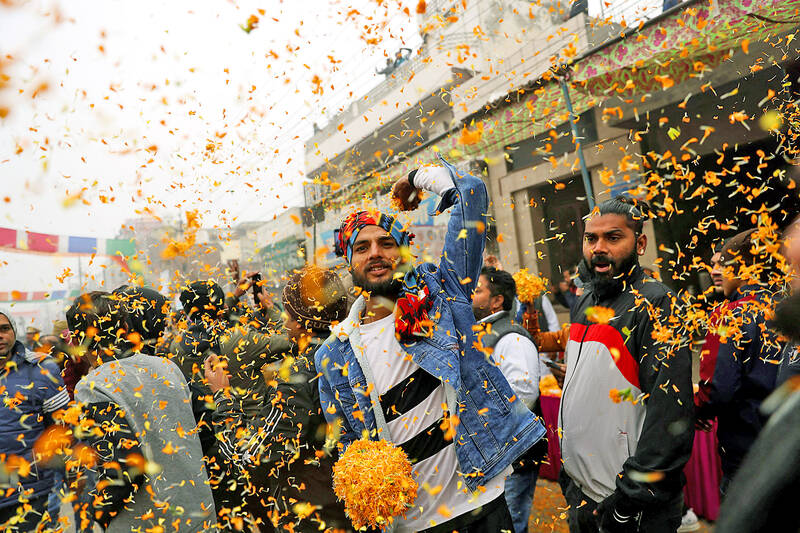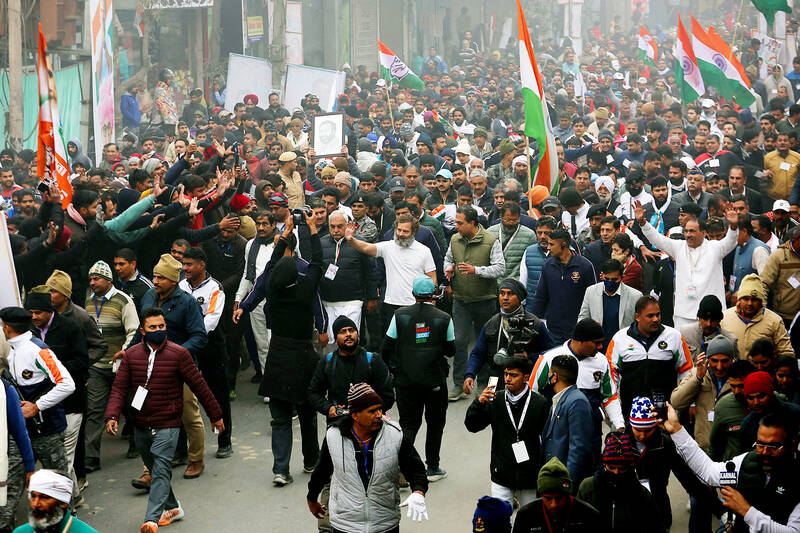An old Bollywood film song playing on loop exhorted travelers to keep walking as opposition leader Rahul Gandhi and an entourage marched through northern India’s Panipat on a frigid morning last week, trailed by hundreds of people.
Gandhi began walking the length of the country more than 100 days ago from India’s southern tip, hoping to repair the battered image of his Indian National Congress party and take on Indian Prime Minister Narendra Modi’s dominant Bharatiya Janata Party (BJP).
Stopping to greet onlookers and holding public meetings, Gandhi plans to round off his march in northernmost Kashmir by the end of the month.

Photo: Reuters
“Long live Rahul Gandhi,” Congress party supporters shouted, as the scion of a dynasty that has given India three prime ministers marched through Panipat on his Bharat Jodo Yatra, or “Unite India March.”
The 52-year-old, a fitness buff with a thick salt-and-pepper beard, walks about 25km per day, stopping for the night in a trailer van that moves with him.
Gandhi’s grueling march that is to cover about 3,500km is a throwback to the padayatras or foot journeys through the rural heartland by past leaders, including independence hero Mahatma Gandhi nearly a century ago. The two Gandhis are not related.

Photo: Reuters
This modern version of the march gives hundreds of thousands of people face time with a leader who has seemed distant and aloof in the past. Congress is hoping that the crowds Rahul Gandhi is attracting will eventually translate into votes.
“Now that he has hit the streets, people can see who he is,” said Dharamvir Arya, a 55-year-old farmer who had come to see Rahul Gandhi in Panipat. “If he remains in a bungalow, hidden, how will people know what he is like?”
Polling agency CVoter, which has tracked Gandhi’s approval ratings in nine states — four of which would hold local elections this year — as part of nationwide monthly surveys of 30,000 respondents, found the Congress leader’s popularity has risen markedly in most states through which he has marched.
In the southern state of Karnataka, which is to hold elections this summer, the percentage of respondents satisfied with Rahul Gandhi has risen from 39 percent in January last year to nearly 58 percent immediately after the march passed through.
The once-dominant Congress controls less than 10 percent of the elected seats in parliament’s lower house and has been devastated in two successive general elections by the BJP, most recently in 2019 under Rahul Gandhi’s leadership.
Modi remains India’s most popular politician by a substantial margin and is widely expected to win a third victory next year.
More than 60 percent of respondents across the country prefer Modi as prime minister to 30.3 percent choosing Rahul Gandhi, CVoter said.
Analysts say that Gandhi’s public image is improving, but it might not be enough for the flagging Congress to immediately convert that into electoral success.
“To invest in Rahul Gandhi’s personal popularity is actually a fairly astute move,” said Neelanjan Sircar, a senior fellow at the Centre for Policy Research think tank in New Delhi.
“Does it yield electoral dividends? That, I think, is unlikely,” Sircar said, pointing to the BJP’s superior organizational abilities and formidable election machinery.
Rahul Gandhi declined interview requests from Reuters.
Indian Lawmaker Digvijay Singh, a senior Congress leader, admitted the party had ceded space as an effective opposition, a function Rahul Gandhi’s march was now fulfilling.
“It is important, it is crucial,” Singh said.
Long seen by critics as a reluctant politician without the earthy skills to take on Modi, Rahul Gandhi’s cross-country march has also provided him a platform to hold the BJP to account on issues such as communal polarization brought by its muscular Hindu nationalist agenda, unemployment and inflation.
“The aim is to stand up against the fear, hatred and violence that is being spread in the country,” Rahul Gandhi told reporters late last month. “I think the march has been quite successful till now, and it has achieved more than we expected.”

Airlines in Australia, Hong Kong, India, Malaysia and Singapore yesterday canceled flights to and from the Indonesian island of Bali, after a nearby volcano catapulted an ash tower into the sky. Australia’s Jetstar, Qantas and Virgin Australia all grounded flights after Mount Lewotobi Laki-Laki on Flores island spewed a 9km tower a day earlier. Malaysia Airlines, AirAsia, India’s IndiGo and Singapore’s Scoot also listed flights as canceled. “Volcanic ash poses a significant threat to safe operations of the aircraft in the vicinity of volcanic clouds,” AirAsia said as it announced several cancelations. Multiple eruptions from the 1,703m twin-peaked volcano in

A plane bringing Israeli soccer supporters home from Amsterdam landed at Israel’s Ben Gurion airport on Friday after a night of violence that Israeli and Dutch officials condemned as “anti-Semitic.” Dutch police said 62 arrests were made in connection with the violence, which erupted after a UEFA Europa League soccer tie between Amsterdam club Ajax and Maccabi Tel Aviv. Israeli flag carrier El Al said it was sending six planes to the Netherlands to bring the fans home, after the first flight carrying evacuees landed on Friday afternoon, the Israeli Airports Authority said. Israeli Prime Minister Benjamin Netanyahu also ordered

Former US House of Representatives speaker Nancy Pelosi said if US President Joe Biden had ended his re-election bid sooner, the Democratic Party could have held a competitive nominating process to choose his replacement. “Had the president gotten out sooner, there may have been other candidates in the race,” Pelosi said in an interview on Thursday published by the New York Times the next day. “The anticipation was that, if the president were to step aside, that there would be an open primary,” she said. Pelosi said she thought the Democratic candidate, US Vice President Kamala Harris, “would have done

Farmer Liu Bingyong used to make a tidy profit selling milk but is now leaking cash — hit by a dairy sector crisis that embodies several of China’s economic woes. Milk is not a traditional mainstay of Chinese diets, but the Chinese government has long pushed people to drink more, citing its health benefits. The country has expanded its dairy production capacity and imported vast numbers of cattle in recent years as Beijing pursues food self-sufficiency. However, chronically low consumption has left the market sloshing with unwanted milk — driving down prices and pushing farmers to the brink — while